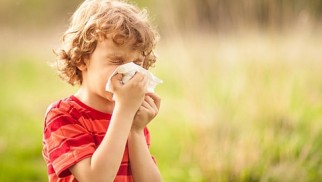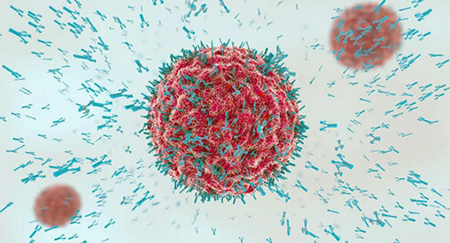What is allergic rhinitis and other types of allergy and how are they treated?


There are many definitions of allergy on the internet. But they do not always correctly reveal the essence of the disease, from which, according to American scientists, at least 40% of the world's population suffers. And this figure will only grow. Because allergies are triggered by various factors that we face every day. This, in particular, household chemicals, medicines, polluted air, in summer - pollen of plants, in autumn - spores of fungi. According to the WHO statistics, by 2025 more than 50% of the population of large cities will have some form of allergy.
Allergy is an answer of the person’s immunity to generally harmless agents that the body is exposed to in different ways: through the skin, respiratory system or digestive tract.
Faced with these agents, the organism over time begins to produce antibodies, i.e. special proteins.
What induces allergies?
The agent that provokes an allergic response is referred to as an allergen.
The most frequent allergy factors are:
Pollen
Fungal (mushroom) spores
Mold
Dust mites
Saliva and animal dander
Medications containing bromine and iodine
Antibiotics
Sulfonamides
Vaccines and serums
Non-steroidal anti-inflammatory drugs, including of local action
Nuts
Peanut
Honey
Citrus
Wheat
Soy
Seafood
Milk
Eggs
Fish
Latex
Synthetic fabrics
Cleaning chemicals
Petrol
Acrylic and simple nail polish
Allergy mechanism

In short, we can say that allergy is an increased sensitivity of the organism to any substance that develops upon repeated contact.
The mechanism of allergy is as follows:
1. The immunity recognizes and remembers the allergen. This takes some time.
2. Sensitization. The immune system becomes sensitive to a particular substance and starts producing antibodies to attack it. The period of sensitization is very variable. It can be days, months and even years.
3. The immunity fails and antibodies begin to be made in excess.
4. Further, upon repeated exposure to the allergen, antibodies are activated and induce a set of biochemical reactions: histamine and other biologically-active substances that result in the occurrence of allergy symptoms are released.
5. As a result, an individual begins to experience such symptoms as itching, swelling, redness of the mucosa, runny nose, notices a rash.
To relieve these symptoms, doctors prescribe antihistamines. Usually, in the form of tablets, popularly known as "allergy pills". For allergic rhinitis antihistamine sprays such as Astelin (Azelastine) are also widely used due to their effectiveness and lack of systemic effect, i.e. effect on other organs.
Who are likely to develop allergies?
You may be allergic if:
- Your family history (parents or other close relatives) includes a diagnosed asthma or allergy, for instance, hay fever, hives, or eczema;
- You had developed rash as a child in response to certain food products;
- You have allergic diseases such as asthma.
What organs and body systems are vulnerable to allergens?

Based on the allergen and how it enters the body, the patient may experience different symptoms. For instance, the pollen is inhaled so it is much more likely to impact the nose, eyes, bronchi, and cause a runny nose, tearing eyes, itching in the nose and throat, coughing, and choking.
Food allergies usually cause stomach or intestinal problems; sometimes, also skin rashes (hives or atopic dermatitis).
Allergic reactions can also affect several organs and systems at the same time.
Usually, allergy affects several organs at once:
- Nose, eyes, sinuses, and throat;
- Bronchi and lungs; Sometimes an allergic reaction can induce asthma. When an agent to which the person is allergic is inhaled, the mucous membrane swells and viscous mucus is secreted, a spasm of the smooth muscles of the bronchi occurs. Therefore, a person suffers from lack of air, suffocation, coughing, wheezing on exhalation. Asthma is not all the time of an allergic nature, but in many cases it is allergy that induces it.
- Stomach and intestines; Most stomach upsets are caused by the composition of the food or its spiciness, that is, it is usually not associated with allergies. Foods that are most likely to cause allergies include peanuts, seafood, milk, meat, and eggs. A cow's milk allergy that occurs in babies can cause eczema, asthma, colic and indigestion. In addition, it can lead to stunted growth. Some people cannot digest lactose (milk sugar). This intolerance also causes bloating, gas in the intestines and nausea, but should not be confused with allergies.
- Skin. Skin problems such as eczema (dryness, redness, itching) and hives are common. Hives looks like traces of a sting by nettles and itch strongly. Food can often be the triggers of hives and eczema.
Complications of allergies

Most allergy symptoms are mild to moderate and do not cause serious problems. But sometimes they create severe discomfort, even pose a threat to life.
Remember: life-threatening allergic symptoms require immediate treatment!
Having allergies heightens your risk of other medical problems, such as:
- Asthma, which in many cases is induced by exposure to environmental allergens.
- Sinusitis and infections of the middle ear or lungs. The risk of these conditions is higher if you are diagnosed with hay fever or asthma.
- Anaphylaxis from peanuts, drugs, shellfish, insect bites, and medications. This severe allergic reaction is possible in those who have severe allergies.
Anaphylaxis requires immediate medical treatment. If you know you have had or are having very bad allergy attacks, be sure to develop an anaphylaxis emergency treatment plan with your allergist.
Social implications of allergic rhinitis

Pollinosis, usually also called allergic rhinitis, an allergy to pollen negatively affects not only the state of health, but also the social activity of patients.
German scientists have recently come to such results. The study involved 679 people with hay fever, aged 18 to 35 years.
According to the data obtained, only a third of people with plant pollen allergies seek medical help. Three quarters of the respondents reported self-treatment with antihistamines. At the same time, men tend to neglect their health, and women more often go to doctors and look for information about the disease.
It was found that during the period of exacerbation, when patients suffer from symptoms of hay fever, their performance decreases by a quarter.
That is, during the pollination of plants, an allergic person loses about two working hours daily.
In addition to negatively affecting performance, allergy symptoms reduce the quality of social life:
- A third of men and 40 percent of women with hay fever are forced to periodically refuse to meet with friends;
- Almost all men and women - 90 and 80 percent respectively - restrict their daily activities;
- Three quarters of men and two thirds of women have sleep problems.
The researchers also found that allergic symptoms can increase not only for objective reasons (due to the body's reaction to the allergen), but also because the disease is not taken seriously by a person.
Therefore, according to scientists, patients should follow an individual treatment strategy under the supervision of a specialist. It is important to choose the right doctor-allergist and have constant contact with him.
Allergy prevention

Preventive measures for different types of allergic reactions are individual. But there are rules that are common to everyone:
- Avoid contact with allergens, even when treating allergy symptoms. If, for example, you have hay fever, stay at home, close windows and doors or use window mesh or filter when the air has a high concentration of pollen. Allergy prognosis will help you to find out about its level. If you are allergic to dust mites, keep your home clean, wash your bedding at high temperatures, use acaricidal (anti-mite) agents, and protective bedding.
- Record allergy symptoms and related circumstances in a special diary. Write down what you eat, when symptoms appear, what time of day they occur, and what helps relieve them. This information will be useful to you and your doctor - it will help to identify the individual factors that cause allergies.
- Purchase and wear a medical bracelet (locket) at all times. Such an accessory will help medical workers or bystanders in an emergency to understand the cause of your condition and provide emergency assistance.
What is important to know about allergies?
So, to summarize:
- Allergy occurs as an inadequate immune response of the human body to a certain substance.
- The most frequent allergens are pollen, nuts, house dust. They can provoke different symptoms: watery eyes, sneezing, runny nose, and rash.
- To accurately diagnose allergies, the allergist may take a blood sample or make skin tests.
- Allergy symptoms can be corrected with medications prescribed by your doctor. But the disease itself requires desensitization - allergen-specific immunotherapy, as well as minimizing contact with the allergen.
- A severe allergic reaction - anaphylaxis - can be life-threatening and therefore requires urgent treatment.
Remember that this disease should not be underestimated, because its consequences can be very serious: bronchial asthma, Quincke's edema, anaphylactic shock.
Post by: John Avery, General Practitioner, Manchester, United Kingdom
(Updated at Apr 13 / 2024)
Astelin Azelastine articles:
Some of the trademarks used in this Web Site appear for identification purposes only.
All orders are reviewed by a licensed physician and pharmacist before being dispensed and shipped.
The statements contained herein are not intended to diagnose, treat, cure or prevent disease. The statements are for informational purposes only and is it not meant to replace the services or recommendations of a physician or qualified health care practitioner. If you have questions about the drugs you are taking, check with your doctor, nurse, or pharmacist.

